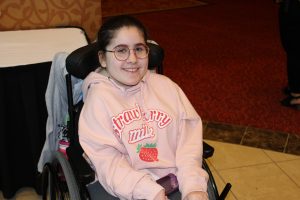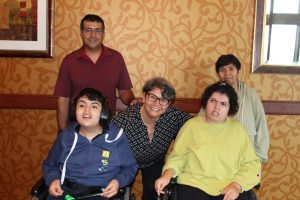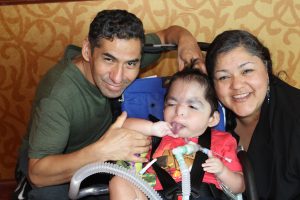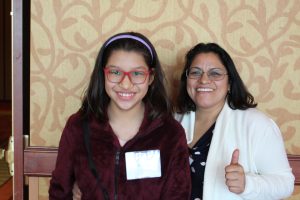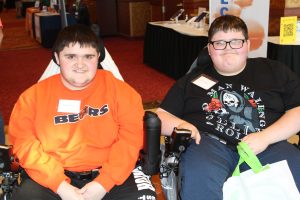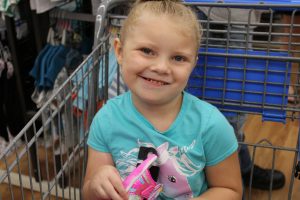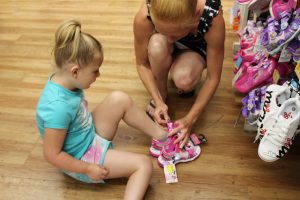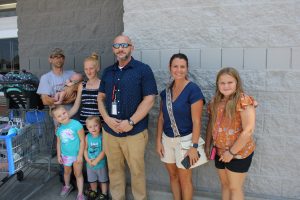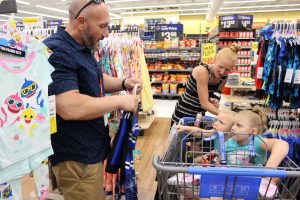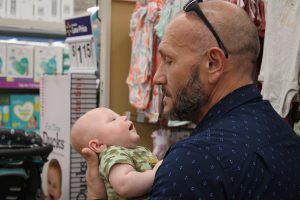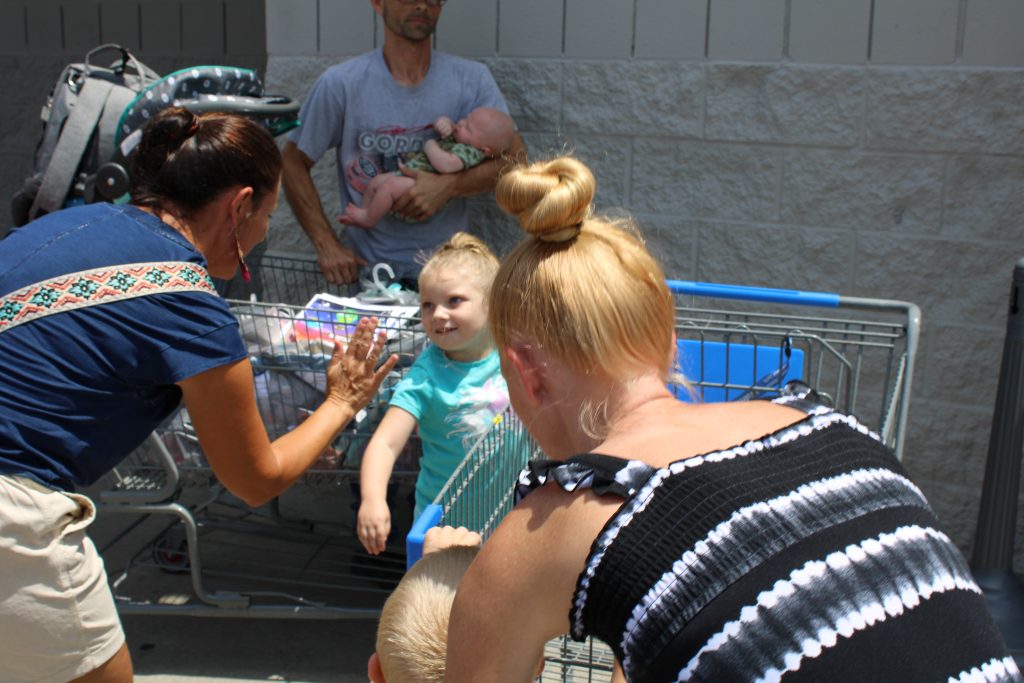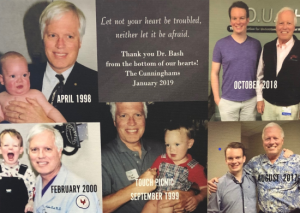New Improvements to DSCC Family Surveys

Updates make it simpler and more convenient for our participant families to share feedback
Our participant families are important to us, and your feedback matters. We’ve updated our family survey process to make it easier for you to share your thoughts about our services.
All participant families receive a series of surveys at certain points in their child’s journey with the Division of Specialized Care for Children (DSCC).
We’ve simplified the process so all families will receive our annual survey at the same time. We will also send you fewer surveys throughout the year.
On Feb. 15, you will receive our updated annual survey. This survey replaces the questions you previously received on your enrollment anniversary.
All families will receive this annual survey every February, regardless of enrollment date.
The survey asks how well DSCC team members are supporting your family and meeting your needs. It also asks about:
- Your contact preferences
- How and when you’d like to meet with our team
- How well our staff communicates with you
How Your Feedback Makes a Difference
Your responses will help us strengthen your services. It also informs our decisions about DSCC policies and procedures that affect your family.
Our surveys are optional, but we strongly encourage you to share your experiences. We want to ensure we’re doing all we can to help you meet your family’s needs and achieve your goals.
We make it a priority to not only listen to our participant families but to follow up on your ideas and concerns.
Recent and ongoing improvement projects that stem from family feedback include:
- We are strengthening our financial assistance process to serve families more quickly and efficiently.
- We are providing more training to our team so they can better explain and share information about state benefits.
- We will begin hosting a series of free webinars in 2023 for participant families to learn about health insurance plans, Medicaid coverage and more.
- We created new tip sheets to explain available benefits and services through the Medicaid waiver for those who are medically fragile and technology dependent (MFTD waiver). You can find these tips sheets on our Waiver Services for Home Care Families page.
We also spent 2022 looking at how to make our survey process more convenient for families. These efforts included gathering feedback from our Family Advisory Council.
FAC members shared concerns about the number of surveys families receive. In response, we removed our series of surveys focused on education. Now you can answer just a few questions about your child’s education needs on the annual survey.
You can find a complete list of our surveys on our Family Surveys page.
Please be on the lookout for the new annual survey on Feb. 15. You will receive this survey either by email or mail, based on your preferences.
If you have questions or need more information, please contact your Care Coordinator.
We appreciate your partnership and look forward to hearing from you!
DSCC Invites Teens to Take Part in New Project to Improve Mental Health Support
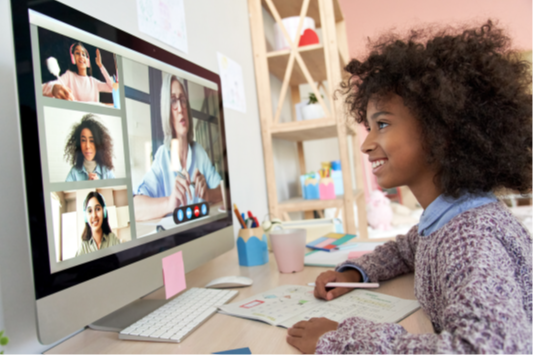
The B.E.S.T. research study looks at how care coordination services that include mental health support can benefit teens with intellectual and developmental disabilities.
Adolescence can be a challenging time for teens with intellectual and developmental disabilities (IDD).
It’s not unusual to feel sad, stressed or overwhelmed.
A new research study opportunity can help teens with IDD learn how to manage these feelings and cope with times of change.
The study is called Behavioral Health Stratified Treatment (B.E.S.T.) to Optimize Transition to Adulthood for Youth With IDD.
The B.E.S.T. study wants to understand if care coordination services that include mental health programming can help teens with IDD live happier and healthier lives.
The study is available for some teens and young adults enrolled with the University of Illinois Chicago’s Division of Specialized Care for Children (DSCC). Eligible DSCC participants must be enrolled in DSCC’s Core Program or Connect Care Program. (Please note that DSCC teens enrolled in the Home Care Program are not eligible to participate.)
All DSCC participants receive care coordination services. The B.E.S.T. study looks at if it’s more beneficial for DSCC teens to receive care coordination that also includes programs to help with mood and stress.
The B.E.S.T. study is a free and voluntary project. Teens can join the study if:
- They currently have a DSCC Care Coordinator and are enrolled in DSCC’s Core or Connect Care programs.
- They are between 13 and 20 years old.
- They have an intellectual or developmental disability.
- They can comprehend at a fourth-grade or similar level.
- They can read and speak English.
- They have a computer, tablet or smartphone they can use to access the internet.
- They have permission from their parent, caregiver or guardian (if they are under 18).
More than 200 DSCC participant families have enrolled in the study as of June 2023.
“I am thankful for the B.E.S.T. program,” one parent participant shared. “It’s helping (my daughter) voice feelings. I hope the program continues for her.”
The B.E.S.T. study team developed the project with input from a group of B.E.S.T. Study Scholars. These scholars are teenagers with IDD who tested and reviewed all of the B.E.S.T. study materials.
“I loved working on the B.E.S.T. project because I got to share my experiences as a teen with a disability,” B.E.S.T. Study Scholar Erin Compton said. “Sometimes people with disabilities have health problems, but we aren’t going to let that stop us.”
Erin also praised the B.E.S.T. study team, led by Project Director Iulia Mihaila, Ph.D.
“I loved working with Iulia and the team because they respected me and all the other self-advocates on the project as leaders,” she said. “B.E.S.T. has a really good team, and I loved being a part of it.”
Erin’s mom, Diane Compton, said the project is a great opportunity to include the voices of those with disabilities.
“The B.E.S.T. team really excelled at including the voices and experiences of all who worked on the project,” she said. “It gives me such hope for the future that organizations are creating these opportunities for young people.”
Iulia said Erin and all the B.E.S.T. Study Scholars provided “immeasurable value” to the project.
“They gave us direction on how to make our work more relevant to teens with IDD and their families. Our work would not have been as strong without them,” Iulia said.
Teens who join the study will be put into one of two groups:
- Group A will receive care coordination services as usual from their DSCC Care Coordinator.
- Group B will receive care coordination services and mental health support from the B.E.S.T. team. This support is based on each teen’s needs and can include:
- Mental health education
- Online group sessions
- Caregiver education and support
The study is a virtual program and should last for two years.
The B.E.S.T. study is a partnership between DSCC and the University of Illinois Hospital and Health Sciences System (UI Health), the University of Illinois Chicago’s (UIC) Department of Disability and Human Development and the UIC Department of Pediatrics.
The principal investigators are Dr. Benjamin Van Voorhees and Dr. Kristin Berg.
The B.E.S.T. study team includes mental health professionals from Illinois, California and Massachusetts. They are all working together to find a way to promote the health and well-being of teens with IDD.
You can learn more information for both teens and parents/caregivers on the B.E.S.T. study website.
If you would like to join the study or have questions, please email the B.E.S.T. study team at beststudy@uic.edu or call (833) 732-5778.
If you choose to join, you and your family can support research that helps other teens and families.
Teens will have the opportunity to learn helpful coping skills for their moods and emotions. Parents and caregivers can gain information on how to support their teens.
Both parents/caregivers and teens must agree to be in the study. (Note that if a teen is their own legal guardian, they can participate alone or with a parent/caregiver if they choose.)
Those who join will be compensated for their time.
We’re excited to be a part of this important research project!
Chicago Care Coordinator Earns DSCC Merit Award
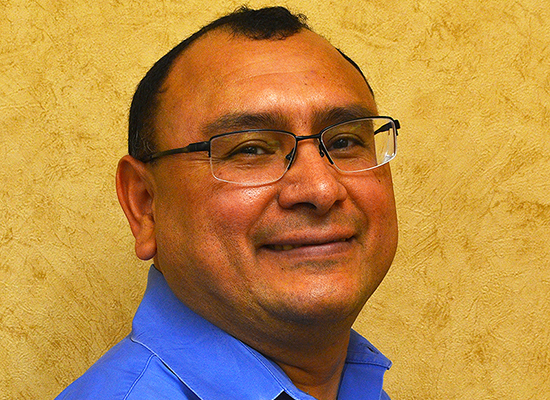
David Martinez honored for his dedication to supporting Illinois children with special healthcare needs and their families
David Martinez is the 2022 recipient of the Merit Award from the University of Illinois Chicago’s Division of Specialized Care for Children (DSCC).
The award recognizes exceptional employees for outstanding dedication and service to Illinois children with special healthcare needs and their families.
David is a Care Coordinator in the Chicago Central Office. In this role, he helps families develop personalized care plans for their children’s unique needs and connects them to the right services and resources.
“David has a remarkable ability to partner with our participant families and empower them to help reach their full potential,” DSCC Executive Director Thomas F. Jerkovitz said. “He works with families from a variety of cultural backgrounds and helps them feel understood and able to navigate the systems involved in their child’s care.”
David’s Chicago teammates say he has a talent for helping families and working “magic” in situations where others might not see a way.
“He is culturally sensitive, proactive and able to put himself in other people’s shoes so that he can better understand their situation and how best to partner with them to find a solution,” said Assistant Director of Research and Practice Initiative and former Chicago Central Regional Manager Patricia Perez.
David is a licensed clinical social worker. He grew up in El Salvador and studied criminal justice after coming to the United States.
He provided substance abuse programs at the Cook County Jail before deciding to pursue social work. This decision stemmed from his desire to help others and make an impact on families as early as possible.
David worked in mental health before joining DSCC in April 2016. He says he is honored to work for DSCC and with his amazing colleagues and managers in the Chicago Central office.
“Building strong relationships with my co-workers and the families we serve energizes me every single day,” David said. “Our families’ needs go beyond just medical. Every day is an opportunity to look at a situation from all different aspects and find a solution that can meet their needs. Sometimes it’s as simple as just listening.”
David said his DSCC career has helped him learn about many different cultures and that care coordination is not one-size-fits-all.
“Meeting the family where they are – that’s my starting point,” David said. “When I’m meeting with families, I tell them we are a team.”
David has helped achieve many successful outcomes for his participant families. In early 2022, he secured a $36,000 grant through the Guaranteed Rate Foundation to purchase and install a vehicle wheelchair lift in a participant family’s van and to make their bathroom wheelchair accessible.
But David says his proudest achievements are the relationships he builds with families.
“It would be impossible for me to deliver my passion in social work without having a relationship with families and open communication,” David said. “To be able to talk to families on a monthly basis and help them navigate through issues in life, that is my biggest accomplishment — having the trust the families place in me and DSCC.”
Our DSCC team nominated a total of 12 of our colleagues for this year’s Merit Award. As the winner, David receives a Merit Award memento, a $2,500 award and recognition from the Executive Director.
The other 2022 nominees are:
- Melissa Croft, Home Care Enrollment Specialist, Lombard Regional Office
- Christina “Tina” Glim, Care Coordinator, Mokena Regional Office
- Kristin Grubb, Administrative Aide, Peoria Regional Office
- Becky Helmink, Program Coordinator Assistant, Olney Regional Office
- Paula Holaday, Home Care Quality Improvement Specialist, Peoria Regional Office
- Marlo Johnson, Human Resources Officer, Central Administrative Office in Springfield
- Amy Jones, Regional Manager, Olney and Marion Regional Offices
- Danielle Osburn, Home Care Claims Process Lead, Central Administrative Office in Springfield
- Elma Saladar, Care Coordinator, Chicago Central
- Cindy Saxsma, Administrative Aide, Central Administrative Office in Springfield
- Katherine Serrano, Care Coordinator, Chicago Core
Congratulations, David! And a big thank you to all the nominees for their excellence on behalf of our participants and their families!
2022 Transition Conference Prepares Youth With Disabilities for Adulthood
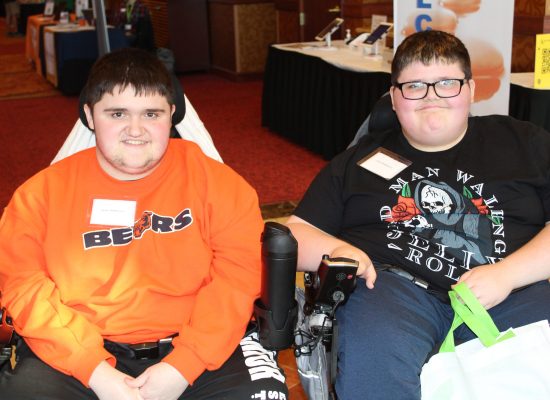
The annual Stepping Stones of Transition Conference gives families and professionals valuable resources and information to support youth on the path to adulthood.
Sixteen-year-old Ayla Etheridge says she’s faced many surgeries and physical limitations throughout her life.
She was born with a spinal lipoma (a mass of fatty tissue) and has experienced nerve damage and scoliosis. At one point, she needed a tracheostomy to breathe.
Ayla now uses a wheelchair and credits her physical challenges with “making my brain better.”
“I always bounce back and don’t want to just sit around and get depressed,” she said.
Ayla is also a careful planner, extremely tech-savvy and loves gaming, character design and writing.
As she attended the Illinois Statewide Transition Conference, Ayla thought more about how these interests and skills will shape her future and career goals.
“I’m very independent and would like to do more things myself,” Ayla said. “This conference has kind of helped me visualize and think about my next steps.”
The 17th annual transition conference, titled “Stepping Stones of Transition,” took place in East Peoria on Nov. 3-4. The conference helps both families and professionals learn about the resources, information and opportunities available for youth with disabilities as they prepare for adulthood.
Ayla and her mom, Rachel, were among nearly 450 people who attended in person.
The University of Illinois Chicago’s Division of Specialized Care for Children (DSCC) helps sponsor the conference and serves on its steering committee.
DSCC also covered the related costs for 34 of our participant family members to attend, including the Etheridges and the Barraza family.
“I am so thankful to DSCC for the fact they covered the cost to be here. That made a big difference in us being able to attend,” Anita Barraza said.
“Education empowers me”
Anita’s son, Daniel, 17, is a DSCC participant. His older sister Diana, 22, left DSCC last summer.
All three attended together along with dad, Jose, and Anita’s mother-in-law, who helped care for Daniel and Diana when they needed a break from conference activities.
“It was great to have my husband be able to be part of the process and that both he and I could listen and take in the information,” Anita said. “(The conference) is also a nice way to spend time together as a family. It’s almost like a mini-vacation for us.”
Anita is an occupational therapist who works with school children, so she understands both sides of the need for information and resources when supporting young adults with disabilities.
“As a parent, we can feel so overwhelmed. Even if help is right there, that reach can be hard to do,” Anita said.
That’s why opportunities to learn about a variety of resources and network with other families and professionals are so important.
“These types of resources educate me on how to best provide for my children’s needs and for their future,” Anita said
Both Daniel and Diana have significant medical needs and are unable to safely live on their own.
Anita says it’s hard to think about, but she realizes must start planning for who can care for Daniel and Diana when she and her husband can no longer do it. Residential placement may be necessary in the future.
The Barrazas also want to learn about possible day programs that can offer one-on-one support to Diana and possible employment options that would work well with her needs.
“Education empowers me to be better prepared to help (Diana and Daniel) have a good quality of life,” Anita said.
“One step ahead”
Anita had told two other DSCC moms about the conference and encouraged them to attend. One of those moms is her friend Yessy Castillo.
Though Yessy’s son, Jacob Ortiz, is only 4 years old, she knew it was important to go.
“I want to be aware of what services are available for Jacob,” Yessy said. “Most importantly, I want to be one step ahead. This conference allows me to get the information on what can benefit Jacob.”
Jacob was born with a cleft palate, an underdeveloped jaw and his tongue pushed back toward his throat. He also had malformations in his hands and feet, and his intestines did not rotate appropriately.
Jacob now has a tracheostomy and depends on a ventilator 24-7 to breathe.
“I appreciate getting the opportunity to meet people and attorneys for advice and support and more legal information on Jacob’s rights,” she said. “If I was not exposed to these events, I wouldn’t know what is available.”
While Yessy speaks limited English, she said the presentations all gave information in a way she could understand.
Melania Tinoco, who also speaks Spanish and learned about the conference from Anita, said connecting with other families at the conference helps her feel more confident.
“It helps seeing we’re all in the same boat and finding out we aren’t alone,” Melania said.
Her daughter Jeny is 14 and has been a DSCC participant since birth. Jeny has Pitt-Hopkins Syndrome, a rare genetic and neurological condition that causes developmental delays.
Melania said the conference has helped her plan for what happens to Jeny if she gets sick and/or can’t take care of her daughter. She also appreciated the breakout sessions on helping youth with disabilities respect their body and feel empowered to say “no.”
“The information has been helpful and inspirational,” Melania said.
Putting information into action
The conference consisted of informative breakout sessions in the areas of employment, education, health care and more.
DSCC participant Vera Lynn Lindquist, 17, and her grandmother, Cheryl Lindquist Calcese, said they enjoyed the “Awareness and Transition Services for Students with Disabilities” session. It gave them helpful information on sex education and tips for building good money management skills.
Cheryl is Vera’s legal guardian. She and Vera planned to start a new budget at home after the conference. Vera will get paid for doing chores, such as cleaning her room, helping with the laundry and feeding her two dogs and cat. She will also get a debit card so she can buy things and track her spending.
Vera has autism, attention-deficit hyperactivity disorder, anxiety disorder from childhood, tinnitus and hearing loss, and seizures.
She enjoys being an advocate, helping others and encouraging everyone to be kind.
During the breakout session, “Your Story Has Power: Great Expectations and Pieces of the Self-Advocacy Puzzle,” Vera stood up and actively participated during the presentation.
Vera and Cheryl hope to attend the transition conference again next year.
DSCC participant Sabrina Doueihi, 20, was among several self-advocates who shared their perspectives during the “Transition Success Stories” breakout session. She is currently a junior at Bradley College, where she is studying criminology. She hopes to go to law school and become a prosecutor.
Sabrina spoke about the importance of staying true to yourself and what you want to do. She also recommended that youth with disabilities focus on what they can do and who can help them achieve their goals.
“Trade stories and network”
For brothers Jaysen and Justen McMenamin and their parents, the transition conference was a good opportunity to plan for life after high school.
Jaysen McMenamin, 18, is a senior at Woodland High School near Streator, where he is an honor roll student and honorary captain of the school’s football team.
He says he’s interested in digital media and related job opportunities. But, he’s still deciding on the path that’s right for him after graduation.
Justen, 14, is a freshman at Woodland High and interested in coding. Both brothers have Duchenne Muscular Dystrophy and are enrolled with DSCC.
Their stepfather, Charles Cusick, said the family wanted to learn more about jobs and career fields that are accessible for the boys and provide more opportunities than what’s available in their small community.
They were also seeking information about camps and other recreation programs for Jaysen now that he has aged out of other programs.
The brothers enjoyed talking with some of the vendors about college resources, job coaching and training programs, and future housing opportunities.
Jaysen would like to live on his own but needs to make sure he has the right supports in place.
The brothers’ mom, Deanna Cox, said she appreciated the breakout session on Supplemental Security Income (SSI) benefits. Jaysen and Justen’s dad passed away in June, and the session helped her better understand how to help her boys keep the benefits they’re entitled to.
The family met up with their DSCC Care Coordinator Kristin Lenover during the conference.
“If families can get away from work, there’s so much they will get out of being at the transition conference,” Kristin said. “Attending in person gives you so much access to all kinds of information. There are also opportunities to meet other families, trade stories and network.”
Thirty DSCC team members attended the conference to network, learn from others and strengthen their skillsets and tools to serve participant families.
DSCC also sponsored the conference’s healthcare track for providers who play a role in the transition from the pediatric to adult healthcare system and those who build youth’s capacity and healthcare skills to prepare for adulthood.
DSCC Transition Specialist Darcy Contri has helped plan the conference since it began 17 years ago. This year’s event was her last before she retires.
“I’m so grateful for and have loved being part of this great work,” Darcy said. “Partnering with talented people from organizations across the state to help others has made a positive difference in so many lives. It is my hope the annual conference will continue to make an impact on improving adult outcomes for youth with disabilities for many more years.”
Visit our Facebook page to see more photos from this year’s conference.
Share Your Feedback on the Nursing Allocation Process
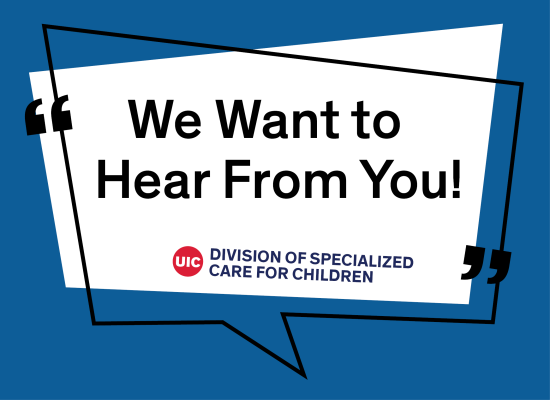
Help our Family Advisory Council recommend changes that can benefit Home Care Program participants and their families.
The Division of Specialized Care for Children (DSCC) helps coordinate and monitor in-home nursing for families through the Home Care Program.
The Illinois Department of Healthcare and Family Services (HFS) determines the number of approved nursing hours after reviewing the individual’s medical reports and medical needs.
Our Family Advisory Council (FAC) now wants to help families better understand the process for how HFS assigns nursing allocations. The FAC also wants to help HFS understand the unique needs and circumstances of Home Care families when deciding nursing allocations.
FAC Advocacy Chair Whitney Woodring is putting together a Nursing Allocation Workgroup to gather feedback on these issues. Whitney’s daughter Willa has received Home Care services since she was a baby. (See Willa’s Family Story for more details.)
Whitney hopes to speak with families across Illinois to learn about their experiences with nursing allocations and the appeal process.
You can email Whitney directly with feedback at w.woodring25@gmail.com.
Whitney would like to hear all input, including positive experiences with the process.
Your feedback will help Whitney and the FAC make recommendations for changes that can benefit as many participants as possible.
To learn more about the FAC, visit our Family Advisory Council page. Be sure to also join the FAC’s next open forum meeting on Nov. 10.
Need more information about nursing services and allocations?
Our Nursing Services Tip sheet gives an overview of Medicaid’s nursing services to help families in the Home Care Program take care of their child’s medical needs:
Our Home Care Appeal and Peer-to-Peer Review Tip Sheet explains how the review and determination of medical eligibility for Home Care services work:
- Appeal and Peer-to-Peer Review Tip Sheet in English
- Appeal and Peer-to-Peer Review Tip Sheet in Spanish
You can find these handouts and other helpful information for families on our Home Care Information Hub.
DSCC Partners with Fowler Bonan Foundation to Offer Back-to-School Shopping Spree for Family in Need
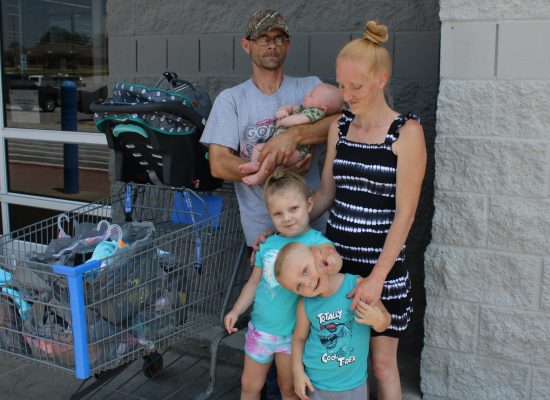
Fowler Bonan Foundation, a southern Illinois nonprofit, worked with DSCC’s Marion Regional Office to provide shoes and clothing for participant Renesmae and her two younger siblings
Renesmae is an outgoing 5-year-old who loves unicorns. She recently started kindergarten with extra sass and confidence thanks to new unicorn outfits and orthotic shoes for the school year.
Renesmae and her two younger siblings received a free back-to-school shopping spree for these much-needed items and more from the Fowler Bonan Foundation.
Renesmae’s care coordination team from the University of Illinois Chicago’s Division of Specialized Care for Children (DSCC) partnered with the foundation to make the special shopping trip possible,
“There’s a lot going on. With the kids starting school, we just didn’t know what we were going to do,” her mother, Misty, said during the shopping trip.
“Everyone at DSCC is really nice. They help with rides to the doctors and other things, but we never expected this. I can’t believe we’re shopping! It’s just above and beyond.”
A family in need
Renesmae has been a DSCC participant for most of her life.
“She had viral meningitis and severe seizures when she was 2 months old,” Misty said. “She has partial paralysis on her right side, can’t open her right hand on command or raise that arm very high, and limps or drags her foot when she walks. Thankfully, she hasn’t had any seizures in a while.”
Renesmae also has hypertonia, which makes her muscles stiff and difficult to move, and homonymous hemianopsia, a condition that causes her to see only one side of the visual field of each eye.
Misty describes Renesmae as “outgoing and not one bit shy.”
“She’s my absolute handful and, like the country song says, can be ‘t-r-o-u-b-l-e,’” she said. “She’s also a great big sister and is always doing stuff for her little brothers. She’s such a mother hen to Liam and Aries.”
Liam is an infant, and Aries is 3. Aries is now starting Head Start, a program that promotes school readiness.
Renesmae’s DSCC care coordination team includes Care Coordinator Cheryl Golliher and Program Coordinator Assistant Renee Woodson. They partner with Renesmae’s family to find treatment options, transportation to appointments and other services to help Renesmae thrive.
“The family let me know they needed help getting her orthotic shoes,” Cheryl said. “Renesmae wants to be like every other kid. The shoes look like any other pair of shoes but are different sizes and fit her brace. The shoes are an important part of keeping her focused on positive things, not other distractions.”
As Cheryl and Renee looked for options for Renesmae’s footwear, they learned all three siblings needed new clothes and shoes for the school year.
A local nonprofit ready to help
Our DSCC care coordination teams can help our participant families find community funding opportunities and resources to meet these important needs.
Amy Jones, DSCC Regional Manager for our Olney and Marion offices, and her team contacted the Fowler Bonan Foundation to see if they could help Renesmae’s family. The foundation provides clothing and shoes to low-income children through their Clothes for Southern Illinois Kids initiative.
“They agreed to help buy clothes and shoes for all of the children and asked that we join their volunteers to help the family shop,” Amy said. “We contacted the family and worked with the foundation and our team to get everything set.”
Bobbie Fox is a Fowler Bonan board member who began volunteering with the organization nearly two decades ago.
“My family was new to the area, and I worked as a store manager. Back then I did all the shopping for our families on my lunch break,” Bobbie explained. “Now, more people know about us and that we offer help in 17 counties throughout southern Illinois. We work with local organizations, community businesses, teachers and others to fundraise and make sure that every bit goes out locally to reach our families and help kids.”
Time to shop
Everyone met at Walmart in Anna on July 20 for the shopping trip. The group included Renesmae’s family – her parents, Misty and Jerry, and little brothers, Liam and Aries – and Bobbie from the foundation and her daughter, Saylor.
Cheryl and Renee were unable to attend. Their teammate Jimmy Baldi, a DSCC Program Coordinator Assistant from the Marion office, volunteered to join the group and help shop.
The first stop was the shoe department. Mom and dad located the right sizes, but the kids had a tough time deciding with so many options to choose from. Renesmae selected Minnie Mouse sandals. Aries went with the Batman sneakers.
“We want to be sure that the kids have shoes and other essentials, such as socks and underwear, in addition to everyday clothes,” Bobbie explained. “The foundation typically provides $100 to $150 for each child to cover these needs.”
A team effort and “win-win for all”
Everyone did their part to help Misty and Jerry feel comfortable and find items the kids needed.
The group took turns hunting for unicorns and superheroes (Aries’ favorite), suggesting styles and finding the right sizes.
Everyone’s efforts were worth it. At the checkout, the kids were happy campers and Misty couldn’t believe they each had five new outfits for school along with plenty of underwear and socks.
Jimmy even snuck in some baby time with Liam.
“I’m really amazed and just so thankful to the foundation and everyone,” Misty said. “These will be hidden away until school starts so that they don’t get messed up.”
As the shopping trip ended, Bobbie exchanged high fives with Renesmae and got a big hug from Aries.
“It’s such a joy to be able to do this,” Bobbie said. “The focus on the kids, partnering with other organizations and individuals. It’s a team effort and a win-win for all.”
The Fowler Bonan Foundation also ordered Renesmae’s orthotic shoes. Jimmy later traveled to the foundation’s headquarters in Harrisburg to pick them up. Cheryl delivered the shoes to the family.
What started as a team effort, ended as a team effort.
“The Foundation is a great resource and so quick to respond to the needs of our families,” said Cheryl. “The shopping trip helped relieve so much stress and worry for the family. It was a great team effort in every sense of the word. I hated to miss the shopping trip, but Jimmy volunteered to go and really loved going.”
We’re thrilled our Marion Regional Office team and the Fowler Bonan Foundation came together to support Renesmae’s family. A big thank you to Fowler Bonan for providing the generous shopping spree!
If you would like to volunteer to help the foundation or know of a family or child in need, please contact them at FowlerBonanFoundation@gmail.com.
You can see more photos from the shopping trip on our Facebook page.
DSCC Regional Manager Earns Outstanding Field Instructor Award
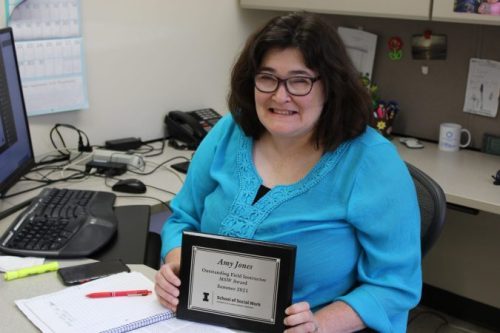
UIUC’s School of Social Work recognized Amy Jones for her dedication and excellent learning experience for interns
Sruthi Thinakkal says her internship with the University of Illinois Chicago’s Division of Specialized Care for Children (DSCC) shaped her as a social worker and taught her the meaning of true teamwork.
Amy Jones, Regional Manager of DSCC’s Olney and Marion regional offices, was an enthusiastic and motivating mentor throughout Sruthi’s experience.
Amy has now received the Outstanding Master of Social Work (MSW) Field Instructor Award for the summer 2021 semester. The honor is from the University of Illinois Champaign-Urbana’s (UIUC) School of Social Work.
“Receiving this award was such a nice surprise! I’m truly honored but never expected it,” Amy said.
The School of Social Work gives the award during each internship rotation to a field instructor who has provided exceptional teaching/mentoring for their MSW intern.
“Based on Sruthi’s nomination letter, it is apparent that (Amy is) dedicated to providing an excellent learning experience for the students, and the School of Social Work is very appreciative,” MSW Field Director Lindsey Trout said in an email announcing the award.
Sruthi nominated Amy for the award after spending two semesters with DSCC’s Marion and Olney offices in 2021. (You can read more about how Sruthi’s internship provided life-changing experiences and lessons.)
“It had been a little while since I’d submitted the nomination, and I’ve been so busy that I completely forgot,” Sruthi said. “It made me so happy! I could go on and on about how Amy shares information and is always willing to help others. It was such a nice surprise, but I just knew she would win!”
Sruthi now works in Chicago with the Rush Craniofacial Center team. She credits her internship with preparing her for a job she loves.
“I gained so many skills that have directly impacted my career,” Sruthi explained. “DSCC taught me so much about working in tune with families, the grief process, the importance of teamwork and listening, and how a monthly call can make such a difference in helping families feel supported and connected.”
Amy says interns aren’t the only ones who benefit.
“It’s a mix of seasoned and new that brings fresh ideas and different perspectives to the workplace,” Amy said. “It’s exciting to watch their growth and know that they’re building a ‘toolbox’ of skills that will serve them well as they move on in their careers. It’s equally rewarding learning from them along the way.”
The Olney and Marion regional offices have recently welcomed two new interns to their team.
“I’m looking forward to learning as much from them as they will from us,” Amy said. “I enjoy being able to talk about the world of social services and sharing about DSCC but It’s really a team effort. All of us work to partner with our families, to help them know about and connect with the services they need.”
Amy’s award has a place of honor in her office – and in her heart.
“The award isn’t just mine. It’s for all of us.”
Congratulations, Amy, on your well-deserved honor!
DSCC and State Health Department Partner to Improve In-Home Nursing Options for Families

A new licensure process for nursing agencies will help provide more options for children and adults in need of in-home nursing care
The nationwide nursing shortage has affected many Illinois families in need of in-home shift nursing care for their children with complex medical needs.
There is a constant demand for more in-home nursing care options in all parts of the state, both rural and urban.
The University of Illinois Chicago’s Division of Specialized Care for Children (DSCC) has partnered with the Illinois Department of Public Health (IDPH) to help meet this need and give families more nursing care options.
DSCC worked with IDPH to change how our enrolled nursing agencies are licensed to serve Illinois counties. Nursing agencies can now be licensed to serve all of Illinois instead of only individual counties.
This change should make it easier for nursing agencies to serve more parts of the state.
Before this change, nursing agencies could only operate within their approved service county area. Nursing agencies had to request approval for each county they wanted to serve.
This process made it difficult for nursing agencies to expand coverage to areas in need. Our participants who receive in-home shift nursing through the Home Care Program could only receive services from nursing agencies licensed for their specific county.
Now all nursing agencies who are licensed and enrolled with DSCC in good standing may serve all Home Care participants in any part of the state.
This broader statewide approach to nursing agency licenses will offer more available nursing options to our participant families.
Please note that each nursing agency must decide if it wants to expand its service area to other parts of the state. This decision is based on nursing staff availability.
We are thankful for IDPH’s partnership to help meet this important need for our participants and their families!
Public Comment Period for MFTD Waiver Updates
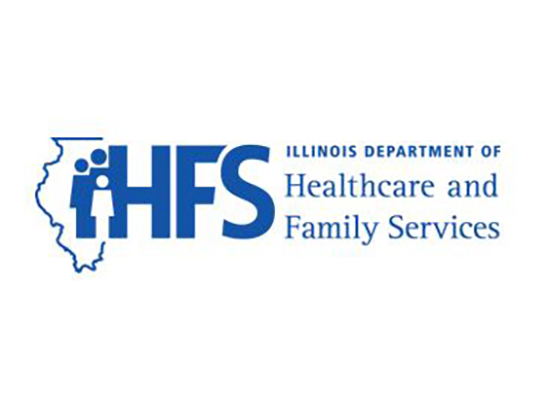
The deadline to share feedback is June 30.
Families have an opportunity to share feedback on proposed updates to the Medicaid Home and Community-Based Services Waiver for Medically Fragile, Technology Dependent (MFTD) Children.
The Illinois Department of Healthcare and Family Services (HFS) is the Medicaid agency responsible for the MFTD waiver. Many families in the Home Care Program have children who receive services through the MFTD waiver.
HFS must renew Illinois’ MFTD waiver every five years. HFS and the Division of Specialized Care for Children (DSCC) have partnered to make several changes as part of this year’s renewal process.
To review the full list of waiver updates, you can:
- See page 2 of the electronic copy of the proposed renewal application.
- Review a hard copy at HFS’ offices at:
- 201 South Grand Ave. E.,
Springfield, IL 62763 - 401 S. Clinton
Chicago, IL 60607
- 201 South Grand Ave. E.,
HFS now seeks public input on these changes. (You can read the public comment notice on the HFS website.)
The deadline to provide feedback is June 30.
You can share your feedback in two ways:
- Via email to HFS.HCBSWaiver@illinois.gov
- Via mail to the Illinois Department of Healthcare and Family Services, Attention: Waiver Operations Management, 201 South Grand Ave. E., 2FL, Springfield, IL 62763
HFS will send your comments to the federal Centers for Medicare and Medicaid Services as part of the waiver approval process.
If you have questions, please contact HFS’s Waiver Operations Management Unit at (217) 524-4148 or (844) 528-8444.
Meet Dr. Stephen Bash, Our Medical Advisory Board Chair

“The help DSCC provides is more important now than it’s ever been.”
Division of Specialized Care for Children (DSCC) Medical Advisory Board Chair Dr. Stephen Bash is a “Hoosier” born and raised.
He attended college and medical school at Indiana University. While doing his rotation at Riley Children’s Hospital in Indianapolis, he fell in love with pediatric cardiology.
“I had completed one year of training, but it takes two years to be board certified for pediatric cardiology,” Bash explained. “I had to make a decision to either continue my training or join my dad at his practice.”
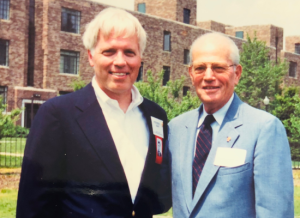
He joined the practice and got hands-on experience treating children with many kinds of complex healthcare needs.
Bash was partially trained and was one of only three pediatric cardiologists in the state of Indiana. For 11 years, he referred his patients, who came from multiple states, to the two specialists he had trained with at Riley Children’s Hospital.
Bash was 40 years old when his dad started to retire.
“So, I figured it was time for a new wife, a Porsche or to go back into a training program,” Bash joked. “I kept my wife, never got a Porsche and completed my training to become a board-certified pediatric cardiologist. Most people do it the other way around, but I completed my academic training after being in private practice for more than a decade as a pediatrician.”
Bash, his wife, Patti, and their four children moved to Houston so that he could finish his fellowship requirements and complete an extra year of heart catheterizations at Texas Children’s Hospital.
Where’s Peoria?
At age 42, Bash was in the job market and fielding offers. Dr. William Albers at OSF Saint Francis Medical Center invited him to Peoria.
“I was invited to visit numerous places around the country. We had Peoria at the bottom of the list,” Bash said. “Patti and I decided we would keep an open mind, look around and talk to people before making our decision. “
The Bashes toured Peoria and found there was a lot to like. He joined OSF Saint Francis Medical Center, where he helped start the Congenital Heart Clinic and connected with DSCC.
“I initially started with DSCC evaluating and accrediting congenital heart program centers in Illinois,” said Bash. “I quickly realized that these centers of excellence were only one piece and began to connect with the other subspecialists in the state.”
It was Dr. Bash who had the dream of starting the Children’s Hospital of Illinois. The hospital eventually grew from 15 pediatric subspecialists in 1985, when he joined the pediatric cardiology group, to 150 pediatric subspecialists. It also underwent a $283 million project that included building a new facility.
In 1986, as Peoria was taking on this project to grow The Children’s Hospital of Illinois, Dr. Albers stepped down from chairing DSCC’s Medical Advisory Board (MAB). He asked Bash if he would like to join the board.
Bash accepted and has been serving in many ways since.
“I will continue to help”
The MAB is a diverse group of healthcare professionals. Each offers a unique perspective on how DSCC can enhance our care coordination services for children with special healthcare needs.
“Over the years I’ve worked with all kinds of subspecialists. I’ve also seen what the families have to go through,” explained Bash. “DSCC’s (program) is the only one that coordinates care statewide and helps steer these families through a confusing maze of insurance changes, seeing all kinds of specialists and understanding their treatment options. The help DSCC provides is more important now than it’s ever been.”
Knowing the many challenges medically complex children and their families face, Bash has focused on breaking down silos and building lasting connections to improve care.
“I began connecting with other doctors and providers in the state. Just like DSCC covers the entire state, Peoria’s pediatric cardiology clinic outreach is also wide-ranging,” Bash said.
“Even if we were competitors, we could still cooperate. For example, OSF could refer transplants to Chicago or St. Louis. Silos don’t work for the families, so creating lasting partnerships to help these families has always been at the forefront.”
Bash said he has always tried to make serving on the board personal because “what you see in a clinic or the hospital isn’t the same as visiting a family in the home.”
“Visiting these families in their homes gave me a much different picture of what they were going through. It was very humbling and not something you will get from your hospital clinic experience. Now, DSCC is there to help these families coordinate care.”
The University of Illinois Board of Trustees appoints DSCC’s Medical Advisory Board members for a three-year term. The MAB membership currently includes pediatric specialists in cardiology, rehabilitation, plastic and reconstructive surgery, neurology and more.
“I am so impressed by our members and all that they do,” Bash emphasized.
“The amazing parent, specialist and staff presentations to the board continue to help us learn about and better understand the different specialties, the many pieces involved in getting and providing care and the ways we can help impact making the services these families need available. We volunteer because we love what we do, and the need is so great.”
Dr. Bash retired from OSF three years ago and continues to enjoy leading the MAB.
“I feel like I’ve lived in the best age of medicine for any physician,” said Bash.
“From the development and mass production of penicillin to the eradication of polio, to the amazing procedures now being done in pediatric cardiology, we’re now doing cardiovascular surgery that I never thought would be possible in such tiny hearts,” he said.
“I’ve had a fabulous career, and DSCC has been an important part of that. There is no question that the needs of these families are very complex. As long as DSCC allows me to, I will continue to help.”
Thank you for your exceptional service, Dr. Bash!
Visit our Medical Advisory Board page to learn more about the MAB and its mission.



